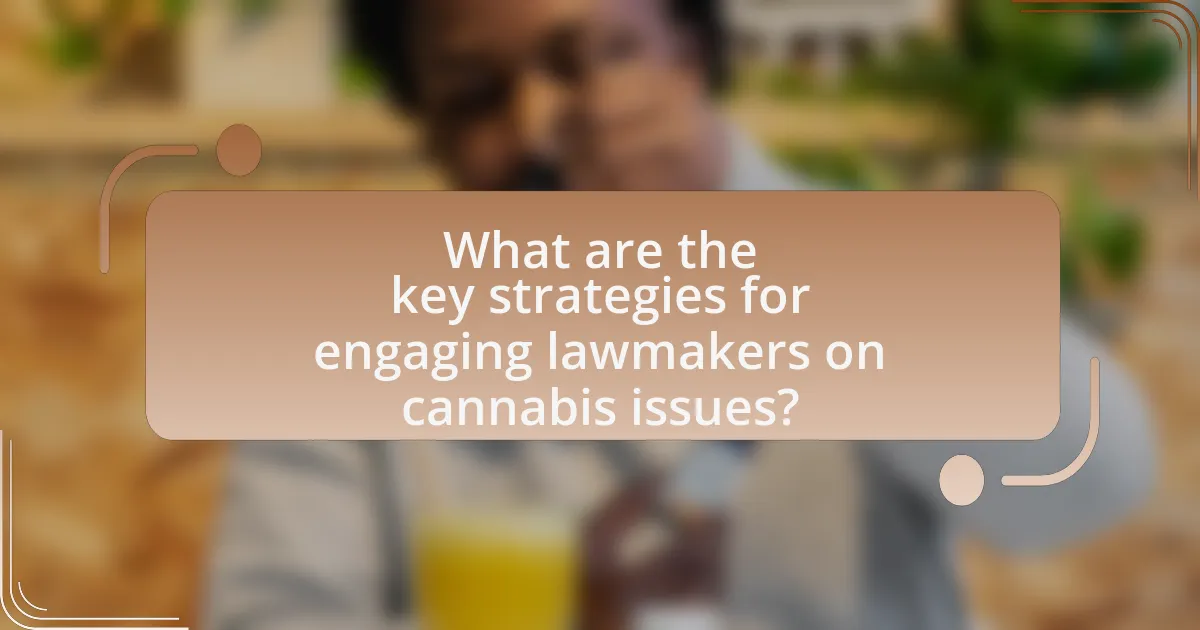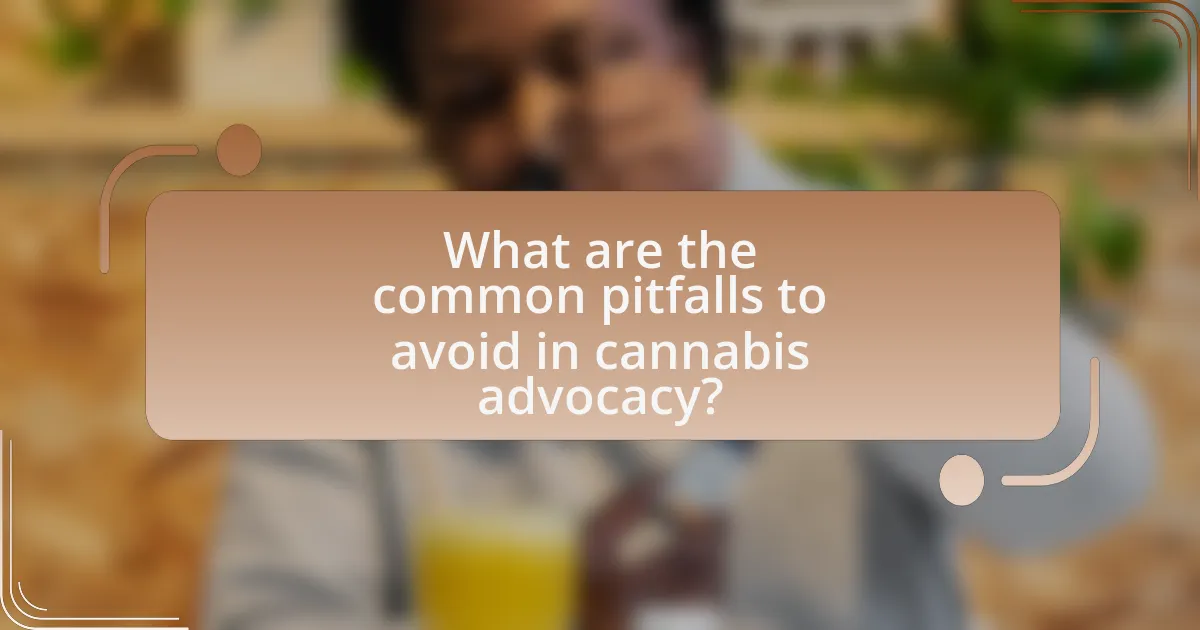The article focuses on effective strategies for cannabis advocates to engage lawmakers in policy discussions. It outlines key approaches such as building relationships, providing credible information, and mobilizing grassroots support to influence legislative priorities. The article emphasizes the importance of clear communication, data-driven arguments, and tailoring messages to different political audiences. Additionally, it discusses the significance of understanding the legislative process, maintaining ongoing relationships with legislators, and leveraging community engagement to enhance advocacy efforts. By employing these best practices, advocates can effectively navigate the complexities of cannabis legislation and drive meaningful policy change.

What are the key strategies for engaging lawmakers on cannabis issues?
Key strategies for engaging lawmakers on cannabis issues include building relationships, providing credible information, and mobilizing grassroots support. Establishing personal connections with lawmakers fosters trust and opens lines of communication, making it easier to discuss cannabis-related policies. Presenting well-researched data, such as statistics on economic benefits or public health outcomes, enhances the credibility of the advocacy efforts. For instance, a report from the Congressional Research Service highlights that legalizing cannabis can generate significant tax revenue, which can be a compelling argument for lawmakers. Additionally, mobilizing grassroots support through organized campaigns and public demonstrations can demonstrate to lawmakers that there is substantial voter interest in cannabis reform, influencing their legislative priorities.
How can cannabis advocates effectively communicate their message?
Cannabis advocates can effectively communicate their message by utilizing clear, factual information and personal stories to resonate with their audience. Research indicates that personal narratives can significantly influence public opinion, as they humanize the issue and create emotional connections. For instance, a study published in the Journal of Health Communication found that storytelling can enhance the persuasiveness of health-related messages, making them more relatable and impactful. Additionally, advocates should engage in active dialogue with lawmakers, presenting data on the economic benefits of cannabis legalization, such as increased tax revenue and job creation, which have been documented in various state reports. By combining personal experiences with solid evidence, cannabis advocates can create a compelling narrative that effectively communicates their message to lawmakers and the public.
What messaging techniques resonate best with lawmakers?
Messaging techniques that resonate best with lawmakers include data-driven arguments, personal stories, and clear, concise communication. Data-driven arguments provide lawmakers with concrete evidence, such as statistics on public support for cannabis legalization, which can influence their decision-making. Personal stories humanize the issue, making it relatable and demonstrating the real-world impact of cannabis policies. Clear and concise communication ensures that the message is easily understood, allowing lawmakers to grasp the key points quickly. These techniques have been shown to effectively engage lawmakers and drive policy change in favor of cannabis advocacy.
How can advocates tailor their message to different political audiences?
Advocates can tailor their message to different political audiences by understanding the specific values, concerns, and priorities of each group. For instance, when addressing conservative audiences, advocates should emphasize personal responsibility, economic benefits, and public safety related to cannabis legalization, as these themes resonate more with their values. Conversely, when engaging progressive audiences, advocates should focus on social justice, equity in cannabis access, and the potential for reforming criminal justice policies, which align with their priorities. Research indicates that messages framed in a way that reflects the audience’s beliefs can significantly increase persuasion effectiveness, as shown in studies on political communication strategies.
What role does relationship-building play in advocacy?
Relationship-building is crucial in advocacy as it fosters trust and collaboration between advocates and lawmakers. Strong relationships enable advocates to effectively communicate their messages, influence policy decisions, and mobilize support for their causes. Research indicates that personal connections can significantly enhance the likelihood of legislative success; for instance, a study by the National Conference of State Legislatures found that lawmakers are more likely to respond positively to advocates with whom they have established rapport. This underscores the importance of building and maintaining relationships in the advocacy process, particularly in complex areas like cannabis legislation, where nuanced understanding and trust are essential for effective engagement.
How can advocates establish trust with lawmakers?
Advocates can establish trust with lawmakers by consistently providing accurate information and demonstrating transparency in their communications. Building a reputation for reliability encourages lawmakers to view advocates as credible sources. For instance, when advocates present well-researched data on cannabis legislation, such as statistics from the National Conference of State Legislatures showing the economic benefits of legalization, they reinforce their trustworthiness. Additionally, maintaining open lines of communication and being responsive to lawmakers’ inquiries fosters a collaborative relationship, further solidifying trust.
What are effective ways to maintain ongoing relationships with legislators?
Effective ways to maintain ongoing relationships with legislators include regular communication, providing valuable information, and engaging in collaborative initiatives. Regular communication can be achieved through scheduled meetings, phone calls, or emails, ensuring legislators are updated on relevant issues and developments. Providing valuable information, such as research findings or data on cannabis-related impacts, helps legislators make informed decisions and demonstrates the advocate’s expertise. Engaging in collaborative initiatives, such as community events or joint projects, fosters a sense of partnership and shared goals, reinforcing the relationship. These strategies are supported by the fact that consistent engagement leads to increased trust and responsiveness from legislators, as evidenced by studies showing that advocates who maintain regular contact are more likely to influence policy outcomes.
Why is understanding the legislative process crucial for advocates?
Understanding the legislative process is crucial for advocates because it enables them to effectively influence policy decisions and navigate the complexities of lawmaking. Advocates who grasp the stages of legislation, from proposal to enactment, can strategically engage with lawmakers, ensuring their issues are prioritized. For instance, knowledge of committee structures and timelines allows advocates to time their outreach and mobilize support at critical junctures, increasing the likelihood of favorable outcomes. Additionally, understanding the legislative process helps advocates identify key stakeholders and allies, facilitating coalition-building that can amplify their voices and impact.
What are the key stages of the legislative process that advocates should know?
The key stages of the legislative process that advocates should know include introduction, committee review, floor debate, voting, and reconciliation. During the introduction stage, a bill is formally presented in either the House or Senate. The committee review stage involves detailed examination and discussion of the bill by a specialized committee, which may hold hearings and gather expert testimony. Following committee approval, the bill moves to the floor debate stage, where all members can discuss and propose amendments. The voting stage occurs after debate, where members cast their votes to approve or reject the bill. If both chambers pass different versions of the bill, the reconciliation stage is necessary to resolve discrepancies before final approval. Understanding these stages is crucial for advocates to effectively navigate the legislative process and influence outcomes.
How can advocates leverage legislative timelines to their advantage?
Advocates can leverage legislative timelines by strategically aligning their advocacy efforts with key legislative milestones, such as bill introductions, committee hearings, and voting sessions. By understanding the legislative calendar, advocates can time their outreach, mobilization, and public campaigns to coincide with these critical moments, thereby increasing the likelihood of influencing lawmakers. For instance, during the lead-up to a committee hearing, advocates can organize grassroots campaigns to demonstrate public support, which can sway committee members’ opinions. Historical examples show that coordinated advocacy efforts during specific legislative timelines have led to successful cannabis policy reforms in various states, highlighting the effectiveness of this approach.

What are the best practices for organizing advocacy efforts?
The best practices for organizing advocacy efforts include establishing clear goals, building a coalition, and utilizing effective communication strategies. Clear goals provide direction and measurable outcomes, ensuring that all efforts are aligned towards a common purpose. Building a coalition involves bringing together diverse stakeholders, which enhances credibility and broadens the reach of advocacy initiatives. Effective communication strategies, such as targeted messaging and leveraging social media, facilitate engagement with lawmakers and the public, increasing the likelihood of influencing policy decisions. Research indicates that coalitions can amplify advocacy efforts, as seen in successful campaigns for cannabis legalization in various states, where unified voices led to significant legislative changes.
How can advocates mobilize grassroots support effectively?
Advocates can mobilize grassroots support effectively by leveraging community engagement strategies that foster personal connections and shared goals. Building relationships with local organizations, hosting educational events, and utilizing social media platforms to spread awareness are essential tactics. For instance, a study by the Center for American Progress found that grassroots movements that engaged in face-to-face interactions increased participation rates by 50%. Additionally, providing clear calls to action and facilitating easy access to advocacy tools can empower individuals to participate actively in campaigns.
What strategies can be used to engage the community in advocacy efforts?
To engage the community in advocacy efforts, strategies such as organizing educational workshops, leveraging social media campaigns, and forming partnerships with local organizations can be employed. Educational workshops provide community members with essential knowledge about advocacy issues, fostering informed participation. Social media campaigns can amplify messages and mobilize support quickly, as evidenced by the success of various grassroots movements that utilized platforms like Twitter and Facebook to raise awareness and drive action. Forming partnerships with local organizations enhances credibility and expands outreach, as seen in initiatives where coalitions of nonprofits successfully advocated for policy changes by pooling resources and expertise. These strategies collectively create a more informed and active community, essential for effective advocacy.
How can social media be utilized to enhance grassroots mobilization?
Social media can enhance grassroots mobilization by providing a platform for rapid communication, community building, and mobilization of supporters. It allows advocates to share information, organize events, and rally support for cannabis-related initiatives effectively. For instance, campaigns like the “Yes on 64” initiative in Colorado utilized social media to engage voters, resulting in a successful legalization vote in 2012, where 55% of voters approved the measure. This demonstrates that social media can significantly amplify grassroots efforts by reaching a wider audience and fostering community engagement.
What are the benefits of coalition-building among cannabis advocates?
Coalition-building among cannabis advocates enhances their collective influence and effectiveness in policy change. By uniting diverse groups, advocates can pool resources, share expertise, and amplify their voices, leading to more robust lobbying efforts. For instance, coalitions can mobilize larger numbers of supporters for campaigns, increasing visibility and pressure on lawmakers. Additionally, research indicates that collaborative efforts often result in more comprehensive policy proposals, as different perspectives contribute to well-rounded solutions. This strategic alignment can also foster stronger relationships with legislators, as a united front demonstrates a significant constituency that lawmakers cannot ignore.
How can diverse organizations collaborate for a common goal?
Diverse organizations can collaborate for a common goal by establishing clear communication channels, aligning their objectives, and leveraging each other’s strengths. For instance, organizations focused on cannabis advocacy can unite by sharing resources, such as research data and policy insights, to create a unified front when engaging lawmakers. This collaborative approach has been evidenced in successful coalitions like the National Cannabis Industry Association, which brings together various stakeholders to advocate for legislative changes. By pooling expertise and fostering a shared vision, these organizations can effectively influence policy and achieve their common objectives.
What are the challenges of coalition-building and how can they be overcome?
The challenges of coalition-building include differing priorities among stakeholders, communication barriers, and resource limitations. To overcome these challenges, advocates can establish clear common goals that align with the interests of all parties involved, facilitate open and ongoing communication to address misunderstandings, and leverage shared resources to maximize impact. For instance, successful coalitions in cannabis advocacy have utilized joint funding initiatives and collaborative campaigns to unify diverse groups, demonstrating that strategic alignment and resource sharing can effectively mitigate the inherent challenges of coalition-building.
How can data and research support advocacy efforts?
Data and research can significantly enhance advocacy efforts by providing evidence-based support for policy changes. For instance, studies demonstrating the economic benefits of cannabis legalization, such as increased tax revenue and job creation, can persuade lawmakers to consider reform. Research from the National Organization for the Reform of Marijuana Laws (NORML) indicates that states with legalized cannabis have seen a 30% increase in tax revenue, which can be a compelling argument for advocates. Additionally, data on public health outcomes, such as reduced opioid prescriptions in states that have legalized cannabis, can further strengthen advocacy positions by showcasing positive societal impacts.
What types of data are most persuasive to lawmakers?
Statistical data, particularly empirical research findings, are the most persuasive types of data to lawmakers. Lawmakers are influenced by data that demonstrates clear trends, such as public opinion polls showing support for cannabis legalization, economic impact studies detailing tax revenue potential, and health studies outlining the benefits or risks associated with cannabis use. For instance, a 2021 study by the Marijuana Policy Project indicated that states with legalized cannabis experienced a 20% increase in tax revenue, which lawmakers find compelling for budgetary considerations. Additionally, data that highlights successful implementation in other jurisdictions, such as reduced crime rates or improved public health outcomes, further strengthens the argument for legislative change.
How can advocates effectively present research findings to influence policy?
Advocates can effectively present research findings to influence policy by utilizing clear, concise messaging that highlights the relevance and implications of the data. This involves tailoring the presentation to the specific interests and concerns of policymakers, using visual aids to enhance understanding, and providing actionable recommendations based on the research. For instance, studies have shown that policymakers respond positively to data that demonstrates economic benefits, such as increased tax revenue from cannabis legalization, as evidenced by the 2021 report from the Marijuana Policy Project, which outlines the financial impacts of cannabis legalization in various states. By focusing on these aspects, advocates can create compelling narratives that resonate with lawmakers and drive policy change.

What are the common pitfalls to avoid in cannabis advocacy?
Common pitfalls to avoid in cannabis advocacy include lack of clear messaging, failure to engage with diverse stakeholders, and neglecting to stay informed about legal developments. Clear messaging is crucial; without it, advocates risk diluting their message and confusing lawmakers. Engaging a broad range of stakeholders, including patients, industry professionals, and community members, ensures a more comprehensive approach and strengthens advocacy efforts. Additionally, staying updated on legal changes is essential, as cannabis laws are rapidly evolving, and outdated information can undermine advocacy credibility.
What mistakes do advocates often make when engaging lawmakers?
Advocates often make the mistake of failing to understand the legislative process, which can hinder effective engagement with lawmakers. This lack of understanding leads to unrealistic expectations about the speed and nature of policy changes. Additionally, advocates frequently focus on emotional appeals rather than providing data-driven arguments, which can diminish their credibility. Research indicates that lawmakers respond better to well-researched proposals that include statistics and case studies, as these provide a solid foundation for policy discussions. Furthermore, advocates sometimes neglect to build relationships with lawmakers, which is crucial for ongoing dialogue and influence. Establishing rapport can significantly enhance the chances of successful advocacy efforts.
How can advocates avoid alienating potential allies?
Advocates can avoid alienating potential allies by fostering inclusive dialogue and demonstrating respect for diverse perspectives. Engaging in active listening allows advocates to understand the concerns and values of potential allies, which can lead to collaborative solutions. Research indicates that inclusive practices in advocacy can enhance coalition-building, as seen in the 2020 study by the Center for American Progress, which found that organizations that prioritize diverse stakeholder engagement are more successful in achieving policy goals. By prioritizing empathy and open communication, advocates can create a welcoming environment that encourages participation from a broader range of supporters.
What are the risks of using overly aggressive tactics in advocacy?
Using overly aggressive tactics in advocacy can alienate potential allies and undermine the intended message. Such tactics often provoke backlash from lawmakers and the public, leading to increased resistance against the advocated cause. For instance, aggressive confrontations can result in negative media coverage, which may damage the credibility of the advocacy group and its objectives. Research indicates that advocacy efforts characterized by hostility can decrease the likelihood of achieving policy goals, as they create an adversarial environment rather than fostering constructive dialogue.
How can advocates ensure their messaging remains relevant and effective?
Advocates can ensure their messaging remains relevant and effective by continuously aligning their communication strategies with current social, political, and legislative trends. This involves regularly researching and analyzing public opinion, legislative developments, and the evolving landscape of cannabis policy. For instance, a study by the Pew Research Center in 2021 indicated that 60% of Americans support cannabis legalization, highlighting the importance of framing messages that resonate with public sentiment. Additionally, advocates should engage with their audience through social media and community events to gather feedback and adapt their messaging accordingly, ensuring it reflects the concerns and interests of their constituents.
What strategies can be employed to adapt to changing political climates?
To adapt to changing political climates, cannabis advocates should employ strategies such as building coalitions, engaging in grassroots mobilization, and staying informed about legislative developments. Building coalitions with diverse stakeholders enhances influence and broadens support, as seen in successful campaigns like the legalization efforts in California, where various organizations united to advocate for reform. Grassroots mobilization empowers local communities to voice their needs and concerns, which can sway lawmakers, evidenced by the significant public support for cannabis reform reflected in polls. Staying informed about legislative developments allows advocates to respond swiftly to changes, ensuring they can adjust their strategies effectively, as demonstrated by the rapid shifts in public opinion and policy regarding cannabis in states like Colorado and Washington.
How can advocates stay informed about legislative developments?
Advocates can stay informed about legislative developments by subscribing to newsletters from relevant organizations, attending public hearings, and following legislative tracking services. These methods provide timely updates on bills, policy changes, and advocacy opportunities. For instance, organizations like the National Cannabis Industry Association offer newsletters that summarize key legislative actions, while services like GovTrack allow users to track specific legislation and receive alerts. Engaging with these resources ensures advocates remain knowledgeable about the evolving legal landscape surrounding cannabis.
What practical tips can enhance the effectiveness of cannabis advocacy?
To enhance the effectiveness of cannabis advocacy, advocates should focus on building strong relationships with lawmakers through consistent communication and education. Engaging lawmakers requires presenting well-researched data that highlights the benefits of cannabis legalization, such as economic growth and public health improvements. For instance, a study by the National Bureau of Economic Research found that states with legalized cannabis experienced a 15% decrease in opioid-related deaths, providing a compelling argument for legalization. Additionally, advocates should participate in local community events to raise awareness and gather support, as grassroots movements have proven effective in influencing policy changes.
How can advocates prepare for meetings with lawmakers?
Advocates can prepare for meetings with lawmakers by conducting thorough research on the lawmaker’s positions, interests, and past voting records related to cannabis legislation. This preparation allows advocates to tailor their messages effectively, aligning their arguments with the lawmaker’s priorities. For instance, understanding a lawmaker’s stance on public health or economic development can help advocates present cannabis policy as beneficial in those areas. Additionally, preparing concise talking points and relevant data, such as statistics on cannabis tax revenue or public support for legalization, strengthens the advocate’s case. Engaging in role-playing scenarios can also enhance confidence and clarity during the actual meeting, ensuring that advocates can address potential questions or objections from lawmakers.
What follow-up actions are essential after engaging with legislators?
Essential follow-up actions after engaging with legislators include sending a thank-you note, providing additional information or resources, and maintaining ongoing communication. Sending a thank-you note reinforces the relationship and shows appreciation for the legislator’s time, which can enhance future interactions. Providing additional information or resources, such as data or studies relevant to cannabis advocacy, can help legislators make informed decisions and demonstrate the advocate’s commitment to the issue. Maintaining ongoing communication ensures that the advocate remains a resource for the legislator, fostering a collaborative relationship that can influence future policy discussions.


